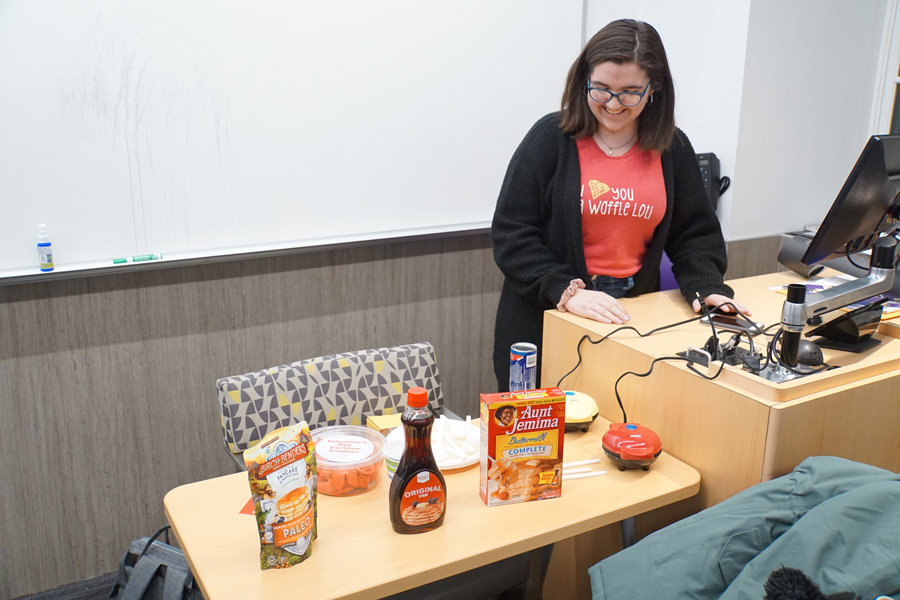Stress is in our DNA: Students reflect on importance of self-care in Northwestern’s high-pressure environment
Owen Stidman/Daily Senior Staffer
Happiness Club at Northwestern hosts its “Galentine’s Day Waffles” event.
February 13, 2020
SESP sophomore Sterling Ortiz used to rarely see the sun.
He would push himself to study late into the night and oversleep the next day. He seldom set aside time for self-care. As a first-generation college student, Ortiz said he felt added pressure to succeed. When this stress became overwhelming, the sophomore finally sought help, going on medical leave this quarter to focus on improving his mental health.
“I grew up with the idea that I have this opportunity to go to college that no one else in the history of my family has ever had,” Ortiz said. “If you take a step back, if you have mental issues at all, you feel very guilty about that. But I had to learn to forgive myself.”
Psychology Central, a blog written by mental health professionals, defines self-care as “any activity that we do deliberately in order to take care of our mental, emotional and physical health.” Yet with both implicit and explicit pressure to succeed academically, join clubs, be social and build a resume — going along with the mantra “and is in our DNA” — many Northwestern students said they find themselves sacrificing self-care in the name of productivity.
For students with marginalized identities, this pressure can be magnified, several students said. But many are working to change this high-stress culture, whether through student-led mental health initiatives or dialogue around self-care.
ASG Health and Wellness Chair Revika Singh’s committee runs initiatives to promote students’ wellbeing, with an emphasis on supporting marginalized groups. This week, ASG is hosting “Wellness Hubs” by handing out candy in Norris, Main Library and Mudd Library. Because student organizations tend to be a major source of stress for students, Singh said the committee is also trying to implement wellness training for club leaders.
“How are we balancing these passions with our own mental health?” Singh said. “For students of color and students with marginalized identities, that entire conversation is even more important because there are a lot of burdens placed on you.”
The Happiness Club also strives to improve students’ wellbeing. They host movie nights and food-related events throughout the year to “make people smile.” On Thursday, they hosted an event called “Galentine’s Day Waffles.”
“At Northwestern, people are expected to just keep doing things,” said Angela Zhou, Happiness Club public relations chair and a Weinberg sophomore. “‘And is in our DNA,’ and people take that to heart. But de-stressing is so underrated.”
Weinberg freshman John McDermott said he went to a high-stress high school, where students and teachers emphasized high test scores and grades.
Striving to foster a healthier environment at Northwestern, McDermott posts once per month in the “Northwestern University- Class of 2023” Facebook group to remind students to practice self-care. During midterms, he told students that they were “more than some numbers.” Then during finals he asked students to let themselves “breathe.”
“After a while, everyone realizes it’s completely unsustainable,” McDermott said. “It’s important to step back, consider what’s important to you and think about where you want to be instead of where you’re supposed to be.”
Email: [email protected]
Twitter: @hannah_feuer
Related Stories:
–Gutierrez: Intersectionality in mental health discussions
–Community Dialogue focuses on mental health, course affordability
–Speak Your Mind: Active Minds’ Stigma Panel facilitates conversation about mental health












